The title pages used in the first two binding styles (1906-34) were, like the endpapers, designed by Reginald Knowles, then working for Dents, in the "Arts and Crafts" style of William Morris. They are works of art in themselves. Each category had its own title page design and motto. The title pages in binding Style 3 (1935-53) were far less ornate, but they had distinct colophons for each category, designed by Eric Ravilious. Later title pages were text only, with no distinguishing art work.
| Biography | Classical | Essays | Fiction |
| History | Oratory | Poetry & Drama | Reference |
| Romance | Science | Theology & Philosophy | Travel |
| Young People | Bedford | Australian | Ravilious |
Click thumbnails to enlarge images.
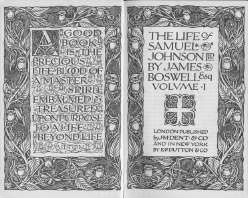
Biography
The quotation is from Milton's Areopagitica, an essay in defense of freedom of speech and of the press. John Milton (1608-74) is most famous, of course, for his epic poem Paradise Lost, considered one of the greatest works, as well as the last true epic, in the English language.
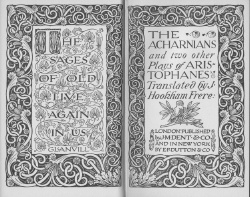
Classical
The quotation is by Joseph Glanvill (1636-80), an English philosopher and clergyman, and comes from Chapter XVII of his Scepsis Scientifica (1661), also published under the title The Vanity of Dogmatizing. The full quotation is "The Sages of old live again in us; and in opinions there is a Metempsychosis." (Thanks to Lucas Graves of Arlington, VA for this information.)
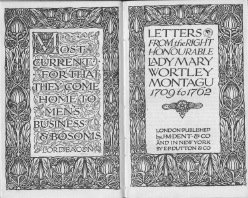 |
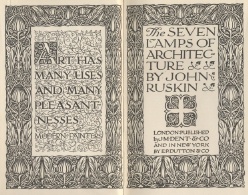 |
Essays & Belles-Lettres
The quotation is from the dedication to the 1625 edition of the Essays by Sir Francis Bacon (1561-1626), the great English philosopher, statesman, and essayist. The actual sentence reads: "My essays, which of all my other works have been most current; for that, as it seems, they come home, to men's business, and bosoms." (Thanks to Phil Williams of London for the source of this quotation.)
Though Ruskin's works are in this section of Everyman's Library and four of them have the Bacon quotation, a quotation from his Modern Painters was used in the following works:
- Elements of Drawing (No. 217)
- Modern Painters (5 vols, Nos. 208-212)
- Pre-Raphaelitism (No. 218)
- Sesame and Lilies (No. 219)
- Seven Lamps of Architecture (No. 207)
- Stones of Venice (3 vols, Nos. 213-215)
- Unto this Last (No. 216)
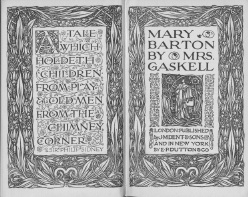
Fiction
The quotation is from The Defence of Poesy by Sir Philip Sidney (1554-86), who was famous in Elizabethan England not only as a poet, but also as a soldier and courtier. This work has had a profound influence on English literary criticism and theory.
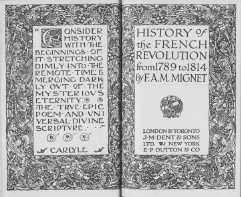
History
Thomas Carlyle (1795-1881) was a Scottish essayist, satirist, and historian whose work was enormously influential during the Victorian era. His sui generis, enigmatic work Sartor Resartus (tr. "the tailor re-tailored") had a large influence on Ralph Waldo Emerson and the New England Transcendentalists. The quotation is from Carlyle's essay "On History Again," to be found in Essays, Vol. 2 (No. 704). (Thanks again to Lucas Graves.)
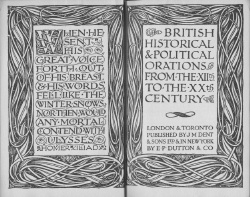
Oratory
The quotation is from Book III of The Iliad, Antenor responding to Helen. The source of this particular translation resisted our efforts to root it out, but once more due to the research talents of Lucas Graves, who has identified itas Emerson's, from his essay "Eloquence" in Society, Solitude, and Other Essays (No. 567).
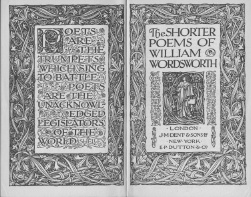
Poetry & Drama
The quotation is from A Defence of Poetry by Percy Bysshe Shelley (1792-1822), the great Romantic poet. He was greatly influenced by the work of similar title by Sir Philip Sidney.
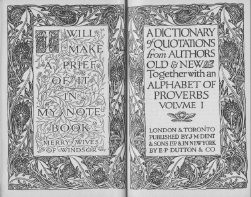
Reference
The Merry Wives of Windsor, of course, was written by William Shakespeare (1564-1616). The quotation is of the Welshman Sir Hugh Evans, in Act I, Scene 1. Shakespeare's spelling of the word "brief" with a "p" is a caricature of a Welsh accent.
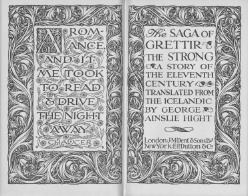
Romance
The quotation is from The Book of the Duchesse, lines 48-9. The most famous work of Geoffrey Chaucer (c. 1343-1400), of course, is The Canterbury Tales, written in Middle English.
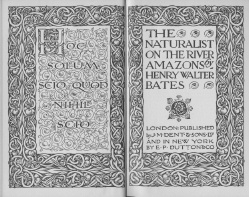
Science
The quotation is attributed to Socrates (c. 470-399 BCE), and translates as "I only know that I know nothing."
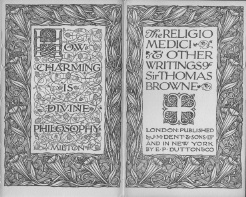
Theology & Philosophy
The quotation is from Comus, line 475, by John Milton (1608-74).
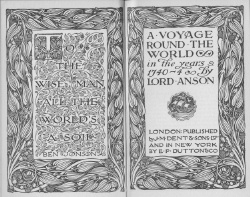
Travel
Playwright Ben Jonson (c. 1572-1637), like his contemporary William Shakespeare, was also an actor and a poet. The quotation is from his play Volpone, Act II, Scene 1. The line is spoken by Sir Politick Would-Be, and actually reads: 'To a wise man, all the world's his soil.' Perhaps Ernest Rhys was quoting from an imperfect memory, but considering Jonson's wit and fondness for puns, Rhys may have been avoiding any scatalogical implications.
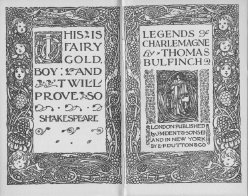
For Young People
The quotation is the Shepherd, in The Winter's Tale, Act III, Scene 3.
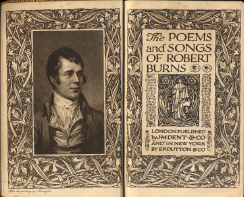
Bedford Title Page
The Bedford binding has a pictorial frontispiece in place of a motto.
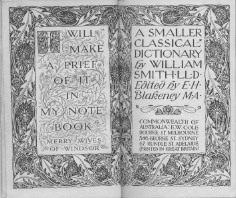
Australian Edition Title Page
Evidently to economize on shipping costs, Dents sent Everyman's Library volumes unbound to E. W. Cole in Australia, where Cole bound them (Guide 4-5). The title page has no mention of either Dent or Dutton, but I would surmise this page was printed by Dents in England as part of the arrangement with Cole, for not only is it part of the bound pages, but it also would be unlikely that Cole would have the elaborate printing plates.
 |
 |
 |
 |
| Biography | Classical | Essays | Fiction |
 |
 |
 |
 |
| History | Oratory | Poetry & Drama | Reference |
 |
 |
 |
 |
| Romance | Science | Theology & Philosophy |
Travel |
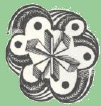 |
|||
| Young People | |||
Ravilious Title Page Devices
The only authoritative treatment of these woodcuts by Eric Ravilious is For Shop Use Only (Devizes: Garton, 1993), with its introduction by Robin Garton and reproductions of the wood engravings Ravilious designed for Dent and Curwen. It is also valuable for the essay on Ravilious by John Lewis, and others by Enid Marx and Robert Harling. The book was published to commemorate the fiftieth anniversary of the death of Eric Ravilious off the coast of Iceland while on a reconnaissance flight to search for a missing airplane in September 1942.